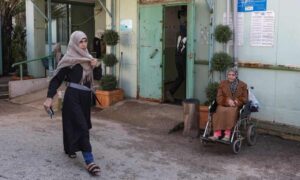
Dr Qassem Salah’s 6,500 patients include many with life-threatening conditions. His small clinic in Beirut’s Mar Elias refugee camp treats cancer patients, those in need of open-heart surgery and at least two people with acute schizophrenia.
It is operated by the United Nations Relief and Works Agency for Palestine Refugees (Unrwa), which supports up to 250,000 Palestinians in Lebanon. They are ineligible for state healthcare but priced out of the private market, says Salah: “There is no alternative for Palestinians.” Without Unrwa, he says, his most critically ill patients “surely will die”.
Palestinians in Lebanon rely on Unrwa for basic services such as healthcare and education. The decision by more than a dozen donors – which together contributed about two-thirds of Unrwa’s funding last year – to freeze payments has left the organisation’s operations facing collapse.
After Israel alleged that Unrwa staff members took part in the 7 October attacks, which killed more than 1,200 people, donors threatened to cut $450m (£350m) funding from the $880m budget, just as the need for its services in Gaza was at its peak. Cuts also threaten its activities in the West Bank, Jordan, Syria and Lebanon.
The Lebanese government is warning that the suspension of Unrwa’s services could create a humanitarian catastrophe that threatens the country’s stability. Unrwa runs 150 sites across Lebanon on a budget of about $180m a year, according to Unrwa’s director there, Dorothée Klaus.
In places such as Mar Elias, these services are a lifeline for Palestinians. In addition to the clinic, Unrwa runs a primary school for 277 pupils – at 95%, the attendance rate for Palestinians in Lebanon is higher than the regional average – and a small water-treatment facility.
It also runs waste-collection services and has helped to pave the narrow streets between Mar Elias’s colourfully painted tenements with concrete patterned to resemble flagstones.
“It’s almost like a village,” says Unrwa’s camp services officer, Ferial Kiwan. She says Mar Elias is quiet and clean, as well as being smaller and more peaceful than most of Lebanon’s 12 camps, the worst of which suffer from high crime rates and poor sanitation.
The camp was established on church grounds to host Christian Palestinians after the 1948 Nakba (“Catastrophe”), in which more than 750,000 people were displaced or expelled from their homes during the creation of Israel and the resulting Arab-Israeli war. It has since become home to 1,700 residents of different faiths, the majority of whom were born in Lebanon.
Despite its peacefulness, unemployment is rife and deprivation is high. Across the country, 80% of Palestinians live in poverty. Growing up in the camps, Kiwan says, “makes you a different person”.
Palestinians are barred from attending Lebanon’s schools, accessing state healthcare or owning property in the country. Most Palestinians in employment have low-paying jobs in the informal sector, but since the economic crisis hit in 2019, these jobs have become harder to find. A recent Unrwa recruitment drive for 30 sanitation workers received 38,000 applicants, including many with higher degrees.
Unrwa is one of the few employers offering white-collar positions to Palestinians. “It is the dream of every Palestinian to find a job there,” says Tarek Moneim, chief executive of Initiate, a programme that supports empowerment and entrepreneurship among young Palestinians in Lebanon.
